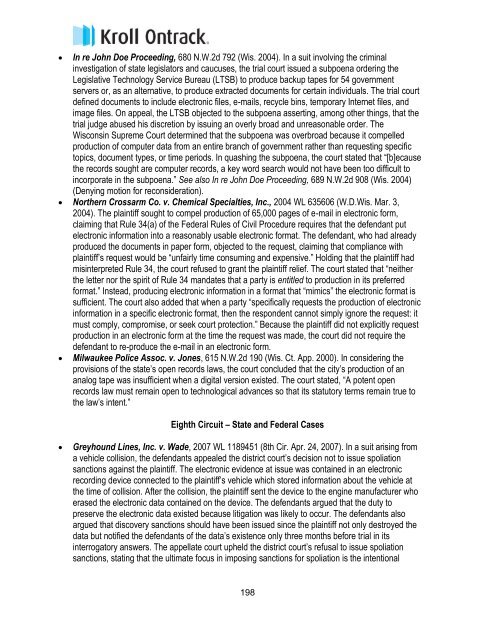Electronic Discovery and Computer Forensics Case List - Kroll Ontrack
Electronic Discovery and Computer Forensics Case List - Kroll Ontrack
Electronic Discovery and Computer Forensics Case List - Kroll Ontrack
You also want an ePaper? Increase the reach of your titles
YUMPU automatically turns print PDFs into web optimized ePapers that Google loves.
� In re John Doe Proceeding, 680 N.W.2d 792 (Wis. 2004). In a suit involving the criminal<br />
investigation of state legislators <strong>and</strong> caucuses, the trial court issued a subpoena ordering the<br />
Legislative Technology Service Bureau (LTSB) to produce backup tapes for 54 government<br />
servers or, as an alternative, to produce extracted documents for certain individuals. The trial court<br />
defined documents to include electronic files, e-mails, recycle bins, temporary Internet files, <strong>and</strong><br />
image files. On appeal, the LTSB objected to the subpoena asserting, among other things, that the<br />
trial judge abused his discretion by issuing an overly broad <strong>and</strong> unreasonable order. The<br />
Wisconsin Supreme Court determined that the subpoena was overbroad because it compelled<br />
production of computer data from an entire branch of government rather than requesting specific<br />
topics, document types, or time periods. In quashing the subpoena, the court stated that “[b]ecause<br />
the records sought are computer records, a key word search would not have been too difficult to<br />
incorporate in the subpoena.” See also In re John Doe Proceeding, 689 N.W.2d 908 (Wis. 2004)<br />
(Denying motion for reconsideration).<br />
� Northern Crossarm Co. v. Chemical Specialties, Inc., 2004 WL 635606 (W.D.Wis. Mar. 3,<br />
2004). The plaintiff sought to compel production of 65,000 pages of e-mail in electronic form,<br />
claiming that Rule 34(a) of the Federal Rules of Civil Procedure requires that the defendant put<br />
electronic information into a reasonably usable electronic format. The defendant, who had already<br />
produced the documents in paper form, objected to the request, claiming that compliance with<br />
plaintiff’s request would be “unfairly time consuming <strong>and</strong> expensive.” Holding that the plaintiff had<br />
misinterpreted Rule 34, the court refused to grant the plaintiff relief. The court stated that “neither<br />
the letter nor the spirit of Rule 34 m<strong>and</strong>ates that a party is entitled to production in its preferred<br />
format.” Instead, producing electronic information in a format that “mimics” the electronic format is<br />
sufficient. The court also added that when a party “specifically requests the production of electronic<br />
information in a specific electronic format, then the respondent cannot simply ignore the request: it<br />
must comply, compromise, or seek court protection.” Because the plaintiff did not explicitly request<br />
production in an electronic form at the time the request was made, the court did not require the<br />
defendant to re-produce the e-mail in an electronic form.<br />
� Milwaukee Police Assoc. v. Jones, 615 N.W.2d 190 (Wis. Ct. App. 2000). In considering the<br />
provisions of the state’s open records laws, the court concluded that the city’s production of an<br />
analog tape was insufficient when a digital version existed. The court stated, “A potent open<br />
records law must remain open to technological advances so that its statutory terms remain true to<br />
the law’s intent.”<br />
Eighth Circuit – State <strong>and</strong> Federal <strong>Case</strong>s<br />
� Greyhound Lines, Inc. v. Wade, 2007 WL 1189451 (8th Cir. Apr. 24, 2007). In a suit arising from<br />
a vehicle collision, the defendants appealed the district court’s decision not to issue spoliation<br />
sanctions against the plaintiff. The electronic evidence at issue was contained in an electronic<br />
recording device connected to the plaintiff’s vehicle which stored information about the vehicle at<br />
the time of collision. After the collision, the plaintiff sent the device to the engine manufacturer who<br />
erased the electronic data contained on the device. The defendants argued that the duty to<br />
preserve the electronic data existed because litigation was likely to occur. The defendants also<br />
argued that discovery sanctions should have been issued since the plaintiff not only destroyed the<br />
data but notified the defendants of the data’s existence only three months before trial in its<br />
interrogatory answers. The appellate court upheld the district court’s refusal to issue spoliation<br />
sanctions, stating that the ultimate focus in imposing sanctions for spoliation is the intentional<br />
198

















